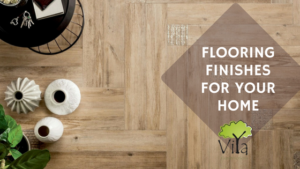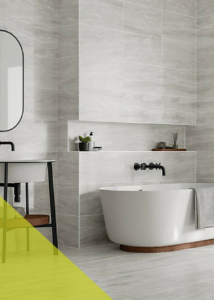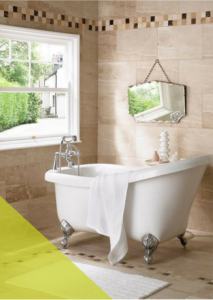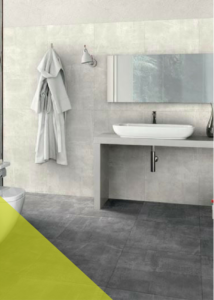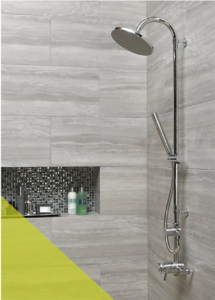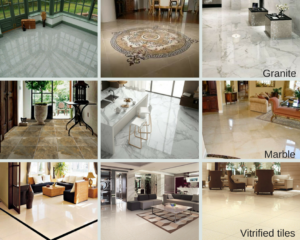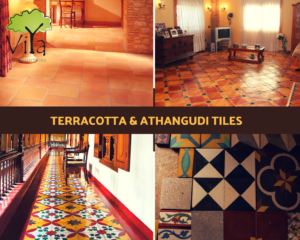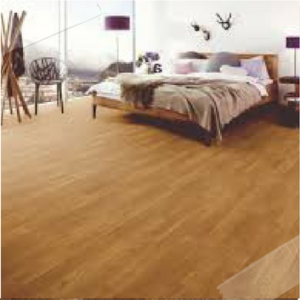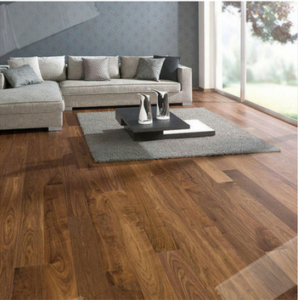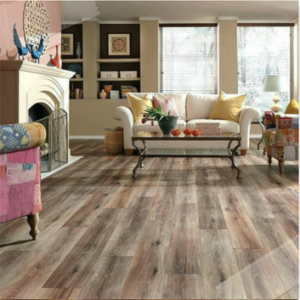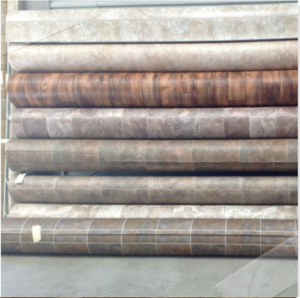Tiling Finishes (A must read if you want to know all about tiling – trends, how to choose and do’s & don’ts)
When you step into a house, the first thing that you feel is the floor! A clean, cool and fine floor reflects the pleasing aesthetics of the home. And for your new house, getting the flooring right is a big task – be it for the interiors or exteriors!
For modern interiors, the choice of flooring options is huge – granite, marble, vitrified tiles, wood, terracotta and many more. How do you know which is the best-suited one for your house?
To make things simpler and easy for you, here is a quick guide on tiling finishes (also called as flooring finishes in general).
Here you will find all about:
- What is tiling or flooring finishes?
- How is tiling done?
- What are the types of tiling available for your home?
- How to choose a type of tiling?
- What are the do’s & don’ts in tiling?
- How to do tiling for the exterior of the house?
What is tiling?
Interior tiling is all about beautifying the floors of every room in your house – which makes it ready for occupation. It makes the surface even, smooth and easy to maintain.
Flooring, also called as tiling finishes, starts once the structure work of the house is completed. It is mostly done after the first phase of electrical finishes, plumbing finishes, and joinery finishes.
Every room in the house – starting from the living room, bedrooms, bathrooms and kitchen need tiling finishes. But, the way tiling is done differs for each area of the house!
However, tiling does not pertain just to the interiors of your house, it is equally important to choose the right kind of tiling for the exteriors as well.
How is tiling finishes done for a brand new home?
The activities that happen in each room is different. Hence tiling for every room is done in its own unique way, that best suits it’s purpose. Accordingly, tiling finishes for a house can be classified into five types.
I. Tiling of the rooms
A uniform tiling is done for places inside the house like sit-out, drawing room, dining room, bedrooms or any common area that lie between the rooms. The most common tiling options for rooms are vitrified tiles, granite and marble. (Read further to see the entire range of flooring options for rooms.)
II. Kitchen flooring finishes
Unlike other rooms, the kitchen is prone to water spills. Hence anti slippery tiles and tiles with grip are used for kitchen flooring. Therefore, tiles with extra grip and anti slippery qualities are preferred to prevent accidents due to water spills.
Further, heavy and sharp objects like utensils and knife can fall down abruptly on the kitchen floor. Hence heavy flooring materials (like marble and granite), that are less likely to get damaged, are also suited for a kitchen.
III. Bathroom flooring finishes
Similar to the kitchen, bathroom floor has to withstand water spills. Anti-slippery tiles with varied textures like – smooth, rough, glossy, hard are available to choose from. Bathroom floors has to withstand heavy water splashes. A good range of textured (like smooth, rough, glossy, hard etc) anti-slippery tiles are available to choose from.
Manufactured tiles are the popular choice for bathroom tiles. They do give the choice of different size and price range. Modern bathrooms have specific wet and dry areas. This gives you the choice of having multiple tiles specific for wet and dry area for a bathroom.
IV. Wall tiling in kitchen and bathrooms (Dado tiles)
Since the kitchen and bathrooms involve heavy water usage, their walls need some extra care. The type of tiles used for walls is generally called as Dado tiles.
In architecture, the term Dado refers to the lower part of the wall. And dado treating walls refers to enhancing the aesthetic and functional purpose of walls.
- Dado tiles in bathrooms – Bathroom walls are prone to splashes of water and lather from soaps and shampoo. Dado tiles are used in bathrooms to cover the walls, making it easily washable. Stain-free walls retain the new look of bathrooms for years. Dado tiles come in varied designs and are smaller in size, compared to floor tiles. They cover half a wall, three quarter of a wall or full-length wall, depending on the design and cost considerations.
Full length Dado
Dado with borders
3/4 length Dado
Dado in Shower Area
- Dado tiles in the kitchen - Splashing and spillage of dishes can stain the walls of the kitchen. To clean it up easily, tiles are placed on the kitchen walls that lie above the working area. In a kitchen, dado tiles are usually done at one or two or three tile heights level spanning from the platform to cabinet. They also come in various design to choose from as per your choice.
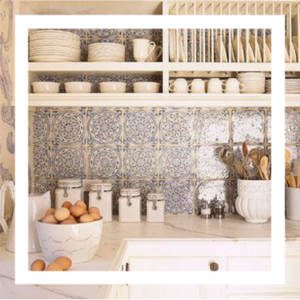
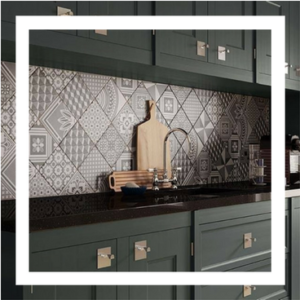
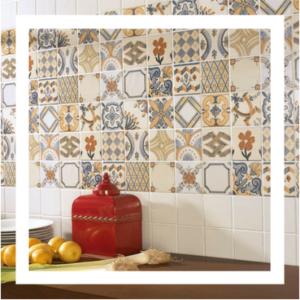
V. Skirting
Apart from the floors, small pieces of tile run across borders of wall and floor in the rooms.
This sort of tiling that is done across length and breadth of the house is called skirting.
Skirting hides the joints between the wall and thereby enhances the aesthetics of the room. It also protects the lower portion of the walls from getting dirty while mopping. Skirting also protects any possible damage to the walls caused by placing furniture very close to the walls
There are multiple ways in which skirting can be done. The most common method is to use floor tiles for skirting. In case the walls are also tiled, tiles of a contrasting colour can be used for an enhanced visual appeal. For a bold look, you can also choose special border tiles that separate the walls and the floor.
Let us now look at the available flooring options and specialties of each.
Most common flooring options for tiling finishes of the rooms
- Granite – Granite gives a grand look. Hence it is ideal for entrance areas, drawing and dining rooms. Granite is a heavy material and is quite difficult to handle. Because of which it is used only on the ground floor. Definitely, it is quite expensive.
- Marble – Marble is yet another option for flooring. It gives a rich look like granite, and is comparatively a less expensive option.
- Vitrified Tiles - Vitrified tiles or manufactured tiles are the trending choices for tiling. The choice of quality and affordable price range makes them an ideal choice of flooring for new homes. Vitrified tiles come in varied sizes. The bigger the tile size, the better the aesthetics of the room. Also, the pricing increases with increasing tile size. As a perfect strike of balance between aesthetics and pricing, the commonly used one is 30 x 30.
Tiles from manufacturers like Kajaria, Simpolo, Johnson, Nitco and Somany are the most commonly used brands in Kerala. Please note that, every flooring option has a premium range as well as an economy range. So choose the flooring considering both aesthetics and affordability.
Natural and sustainable tiles:
- Terracotta tiles – Terracotta is a completely natural flooring choice. It is made from clay and hence gives a traditional look for the floors.
- Athangudi tiles – Athangudi tiles are handmade tiles that give an ethnic ambience for the rooms. They are natural designer tiles from a place called Athangudi in Tamil Nadu. Basic Athangudi tiles resemble richness of a red oxide floor, with added finish and glossiness. They also come in unique designs like geometric and floral patterns. These tiles are made of a mix of natural materials, making it a sustainable construction element. Athangudi tiles are ideal tiling option for people with a taste for sustainable building options.
New trends in flooring:
Wooden flooring – Nowadays, wooden floors are picking up demand in Kerala. It can be made of
- Tiles – Just like normal tiles, wooden tiles are laid to make wooden flooring.
- Planks – Wooden planks of different sizes are connected to form a wooden floor.
- Strips made of wood– Small strips of wood called veneer are pasted over normal floor tiles to get a wooden floor.
Vinyl Flooring- Thin layers or sheets (made of synthetic material) called vinyl sheets can give a design of your choice on the floor. A wooden floor look using vinyl sheets is quite economical than real wood.
Wooden flooring for bedrooms
Wooden floor for living rooms
Vinyl sheets for wooden look
Vinyl Sheets used for flooring
Having these many choices, it is often a tough call to choose the best tiling option for your house. Use the following three thumb rules while finalising the tile for a room!
How to choose a type of tiling material for each room?
The choice of tiling material for a particular room (or area) is based on:
- Meeting a specific need – The chosen flooring has to be suitable to carry out specific activities meant for that area. For example, bathroom tiling has to be anti-slippery and has to withstand water spills.
- Individual taste of the family – Every family has their own preferences. For example, if it is an eco-friendly family, they prefer anything natural - like terracotta tiles.
- Design considerations – Building a house is a collective art. So the choice of tiling has to go well with the entire design of the house. The colour and size of the tile are quite significant to highlight the design. For example, if it is a Naalukettu design (a typical Kerala architecture), a flooring like Athangudi reflects the intricate details of the design.
That sums up choosing tiling finishes for a house. But choosing tiles is not all. While pasting tiles in the respective rooms, extra care is required to make them stay intact forever.
Dos and Don’ts of flooring finishes
- Do a Suitability check
As said above, give utmost care to choose a flooring option that is suited for the activities being carried out in that area. That is, the kitchen should have hard and resistant tiles, a living room tiles should have aesthetics, and bathrooms should have anti skid tiles and so on and so forth. If not, it will bring in big troubles, when you actually start living there.
- Decide on the type of Laying of tiles:
Typically, tiles can be laid in two ways – with a spacer and without a spacer.
With a spacer – A spacer is a small piece of plastic used to space tiles at equal distance from each other. The spaces between tiles is then filled by a process called grouting. Once the grout is dried, sealer is used to give the spaces a proper finish. Using a spacer in tiling gives a grid-like look for the floors.
Without a spacer – Here, the tiles overlap with each other. But often, tiles have minor dimensional variations, resulting in unequal gaps between the tiles. Also in the future, if at all a tile gets damaged, it is difficult to replace it without affecting the adjacent tiles.
In both cases, fixing adhesives are used to ensure that tiles will remain intact. They are a special type of glue which is a mix of cement, polymers (like epoxy) and selected aggregates.
-
Don’t compromise on the Workmanship
Flaw-free tiling comes easy in the hands of an experienced and skilled workman. At every point of time, ensure that tile installation methods are rightly followed. Proper cutting of tiles is a must to have a good finish for the floors.
- Care during Installation
Ensure that the tiles are installed on a flat surface; a substandard surface can result in non-uniform tiling finishes. Wherever there is a chance of water flow (like in bathrooms), introduce optimum slope to direct water to the drainage. Allow enough time for proper curing of tiles after installation. This involves avoiding exposure to moisture, temperature, traffic and overlaying products till curing is done.
- Waterproofing
In the case of bathrooms, water can seep in through the walls or floors. This causes dampness on walls and roof leaks. An ideal solution to prevent this is to perform waterproofing during tiling. For this, a combination of chemicals and epoxy filling is used in between the tiles. Waterproofing of walls involve a series of methods which can be read in detail in our article on waterproofing.
That is all about tiling finishes inside the house. To give a neat look to the surroundings, tiling is done outside the house too.
Tiling Finishes for the Exterior of the house
Tiling of the outside area can be classified into two:
Car Porch tiling – For a functional car park, hard tiles are used for car porches. Special tiles exclusive for car porches are available these days.
Pavement tiling – The area outside the house is made easy to maintain by covering with tiles. Common options are paving tiles and paving stones.
Apart from these, a special tiling called cladding is done on the exterior walls. Cladding tiles are pasted over an existing external surface as a part of elevation beautification to impart a texture and designer look.
Roof Tiling is yet another topic that need to be discussed in this context. Since it is a vast topic, it has been dealt with separately. Read all about roof tiling here.
Indeed, tiling finishes is a big task. A perfectly done tiling enhances the functionality and aesthetics of the home. To experience it first hand, check out our recent constructions.
Get in touch with Viya team to get a quote for the flooring finishes for your building.
YOU MIGHT ALSO BE INTERESTED IN:


